Gamification is a strategy that many ecommerce brands have implemented as part of their online growth strategy. What started as a trend, has quickly become the focus of many conversations about rewards and retention marketing.
Chances are you have interacted or have participated in some sort of gamification, especially if you’ve shopped online recently.
What is gamification in ecommerce?
Gamification in ecommerce isn’t about building something new, but rather amplifying something that already works by applying data-driven engagement techniques to motivate users and create value.
The goal of gamification is to increase engagement and get users to take a specific action. According to Retail Dive:
“Gamification uses elements of play and common game mechanics such as points, badges, and other incentives in nontraditional contexts in order to affect behavior. Done right, gamification is a subtle but fun way to get people engaged.” - Retail Dive
When we think about it this way, the same mechanics that drive gamification are similar to the same ones that enhance VIP reward tiers. VIP tiers are a proven way to boost program engagement and increase success, simply by leveraging customer motivation like status and achievement. As a result, they’re the perfect vehicle for incorporating gamification into your business model.
Why gamification is the perfect fit for VIP tiers
A typical VIP rewards program is looking to achieve one or more of the following goals:
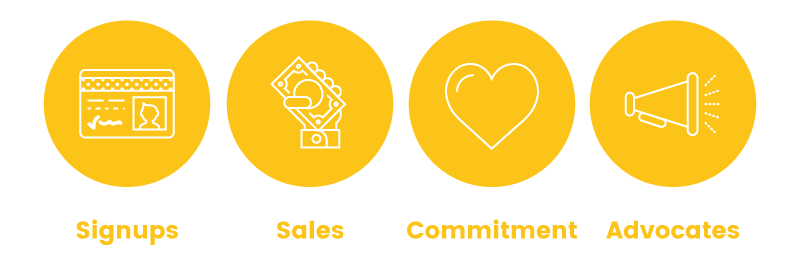
- Increase program enrollment rate (number of signups)
- Increase sales and revenue with repeat purchases
- Encourage customer commitment with status and achievement rewards
- Develop and grow your community, who become powerful brand advocates.
With VIP tiers, you can have customers at different levels who earn different rewards, depending on what tier they are in. “Your program's milestones determine the type of engagement your customers need to have with your community.” Offering tiered levels and rewards is so effective because they leverage three key psychological factors that govern both gamification and rewards.

Using scarcity to build valuable status
One psychological factor is the use of scarcity. Scarcity is defined as the state of being scarce or in short supply and is the secret weapon of gamification and, by extension, VIP tiers. People always want something that’s rare or uncommon, making a tiered program’s upper status highly desirable for all types of customers.
We have only a few seconds to bring a user’s attention to our product or service. Add on top the use of scarcity and you have a strategy used by big brands to capture our loyalty, attention, and dollars.
When you structure your program’s highest tier to include the least amount of customers you get to take advantage of the Local Ladder Effect, which influences people’s desire to know where they stand in relation to their peers.
If they know they’re lower on the VIP ladder, they’ll be motivated to do whatever it takes to reach that higher status–especially if it comes with exclusive rewards, additional benefits, and one-of-a-kind experiences. If they’re on the high end, they’ll be motivated to retain that status.
With this transparent information, customers become increasingly motivated to do one of three things:
- Increase their “lead” over others.
- Maintain their current status.
- Chase victory to attain the highest status.
Regardless of where any given customer finds themselves, they’re met with a challenge to keep striving for the top, which boosts program engagement and participation rates. This prestige power is one of the mechanics that makes video games so addicting, and can quickly have your customers showing the same kind of commitment to your program.
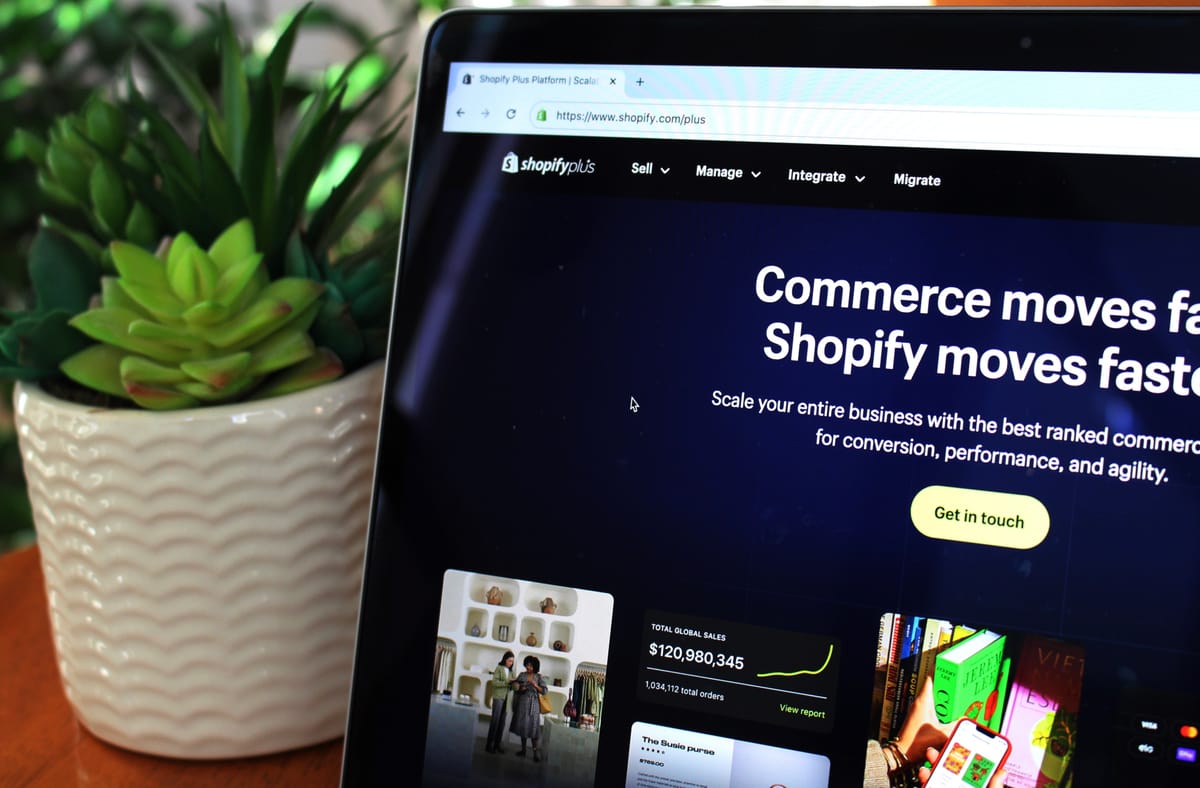
Encouraging consistency with level systems
The concept of scarcity creating value plays directly into the second psychological principle of gamification: consistency. We often hear how consistency is key in building a habit or if we want to have a meaningful change in our lives. The same is true when building a business, brand, or loyalty program.
Consistency in what you offer in your VIP loyalty program will drive customer loyalty. Consistency in how your business is perceived, and how a brand is consistent with its values, will drive business recognition with your customers and potential shoppers.
As a result, customers who are promoted to VIPs are going to want to stay there for fear of risking a change in the way they’re perceived by others. This group of “others” also includes the brand they’re engaged with. If they know they’re seen as being the “best” or most valuable customers, they’re going to be more invested in the brand and their identity within it. These factors make consistency a very easy principle to capitalize on with gamification.
Now you may be wondering how gamification encourages consistency. After all, the scarcity principle demonstrates that gamification is often about upward progression–a fact that should inherently change the way they’re perceived in your program’s structure, right?
While this is true, you can combine the powers of scarcity and consistency by making use of program “levels.” Similar to adventure games like Super Mario Bros you can treat each of your program’s tiers as levels shoppers can “unlock” by completing a variety of valuable actions. This type of progression will set customers up to continue seeking the positive emotion associated with unlocking your highest VIP status, playing to their desire for consistency.
This combination of upward progression and consistency make levels extremely effective. Customers are able to establish a consistent identity for themselves in each level but are still challenged to move up. When they do, they are able to find a new consistency that keeps them motivated until their next progression. This keeps customers from wildly swinging from tier to tier, and ensures they always feel like they belong in the group they’re in.
Skincare brand Riversol's VIP program Riversol Rewards clearly lays out their VIP tiers that move from bronze, silver, and gold. The way you move through the tiers to reach gold is by spending a certain amount. Each tier lays out its benefits for the customer and gives a level of satisfaction and consistency.
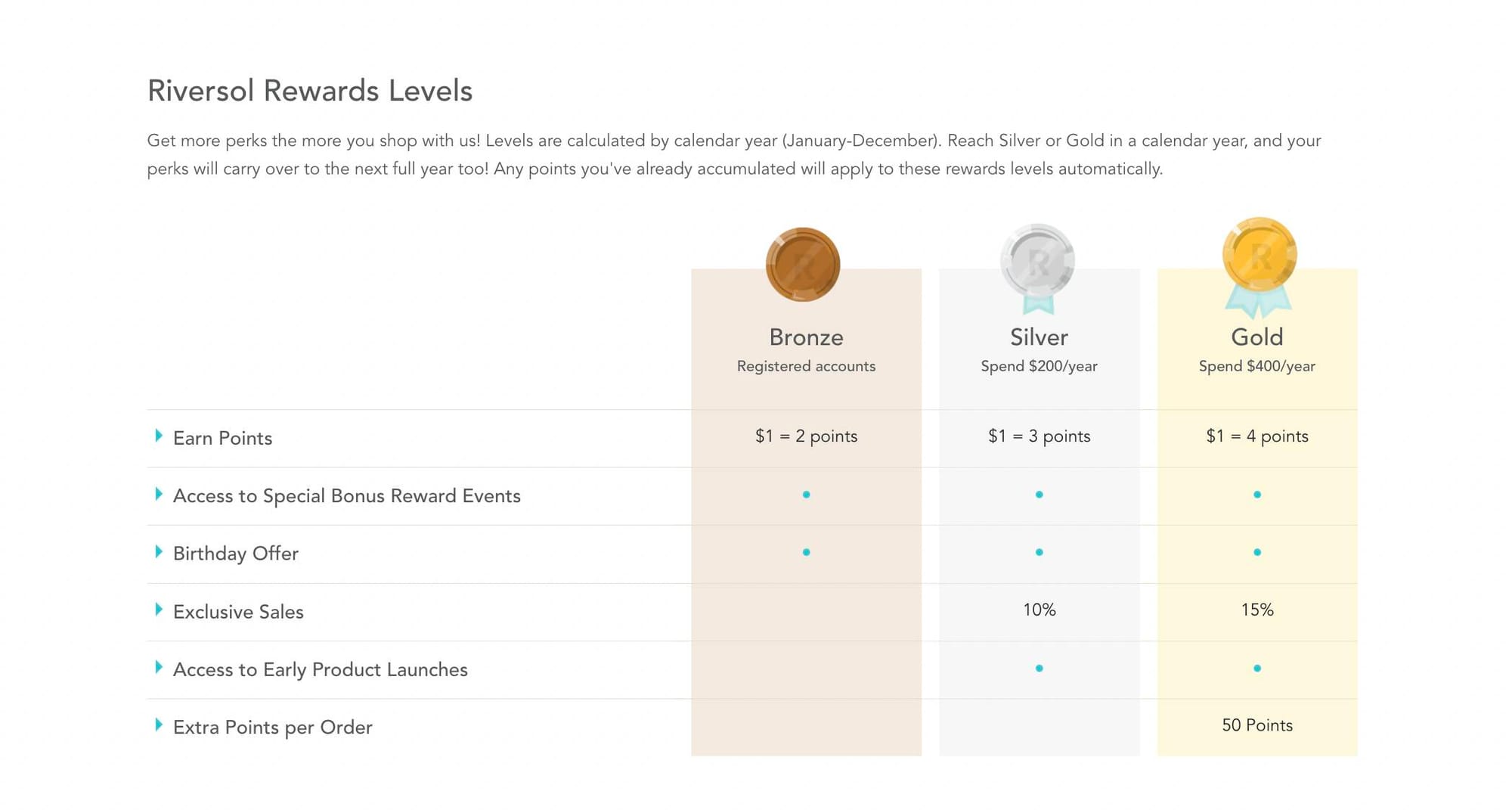
Making consensus visual
The final psychological factor that governs both gamification and rewards is the consensus principle.
We are influenced by our peers and those around us, more than we realize. When our peers agree, we’re more likely to subscribe to a similar line of thinking. When people are in situations and don’t know how to act, often they will look to others in the same setting, to see how they should respond. This is known as the consensus principle, or groupthink–a psychological effect that is extremely impactful in the world of ecommerce. User-generated content (like customer reviews and social sharing) is extremely important to many brands’ acquisition strategies and is used all the time to motivate customer behaviors.

In the case of your VIP program, this is extremely helpful. Today’s customers love to share their experiences and with a camera, social media, and a phone in their pockets, it’s easier than ever before. Especially if it’s something they love or want to show off and tell everyone about! As customers are inducted to your highest VIP tier, they’ll want to share their achievements with their friends and family. When others start to see people in their circle sharing about your VIP status, they’ll trust that this is a goal they should be pursuing, too!

Sephora’s VIB Rouge is a great example of visual consensus at work. Just search for #VIBRouge on Twitter, Instagram, or Google to see the power of consensus in action, as customers all over the world share the joy of finally receiving elite rewards membership! There are even articles dedicated to sharing which products are for VIB Rogue members.
As you can see, visual platforms like Instagram are extremely desirable for customers looking to share their VIP success. Not only is it easy to digest, but it’s also indisputable, shareable, likable evidence of their accomplishments.
These user-generated pieces of content become the rewards counterpart to the badges and awards used to identify top performers in a video game. While they might not function the exact same way, they do both serve to separate their best customers from the rest, identifying them in highly visible, public ways.
How to incorporate gamification mechanics into a VIP loyalty program
Now that we know why gamification and VIP tiers work so well together, it’s time to get these different mechanics incorporated into your own VIP rewards program. While there are a number of different ways of doing it, we’re going to focus on three quick and easy methods that can unlock the benefits of gamification in your VIP program.
Improve enrollment with an explainer page
As we mentioned earlier, improving enrollment rates is a primary goal for many VIP programs. Upfront, this might seem like a really difficult or expensive task–how can you start encouraging more customers to enroll without increasing your acquisition spend?
If you find yourself asking this question, remember that your VIP program is part of a larger retention strategy! You need to do is clearly outline your program’s benefits with a well-designed VIP explainer page. This explainer page is similar to a game manual that gets customers excited to play by providing them with the guidelines they need to get started.
There are two things your explainer page should be–simple to read or understand, and accessible to any customer.
Meaning, that it should be easy to find. Your explainer page should be focused on educating your customers on the benefits of your VIP program, how to join, and how to interact with it. This would include a clear illustration of the different levels, how to move from one to the next, and what is unlocked in each tier. Customers should be able to understand how your tiers work at a glance, so make this page highly visual!
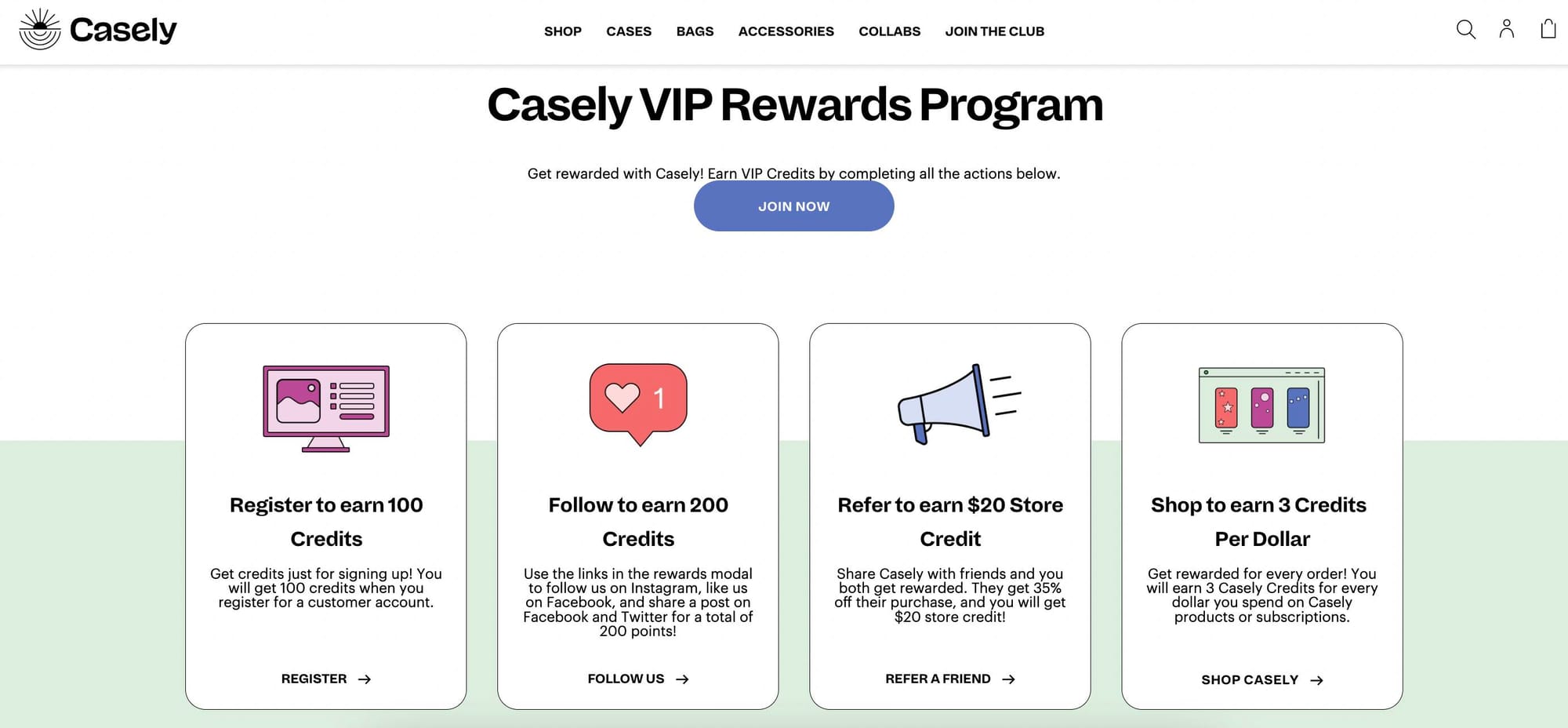
Casely does this exceptionally well with their Casely VIP Rewards Program page. The on-brand graphics immediately brings you in, followed by its icons explaining how to easily earn rewards. With a CTA to join under each box, you can easily have your customers join.
Casely has clearly outlined which benefits are available at each level, making each subsequent tier more valuable than the last with additional perks and rewards.
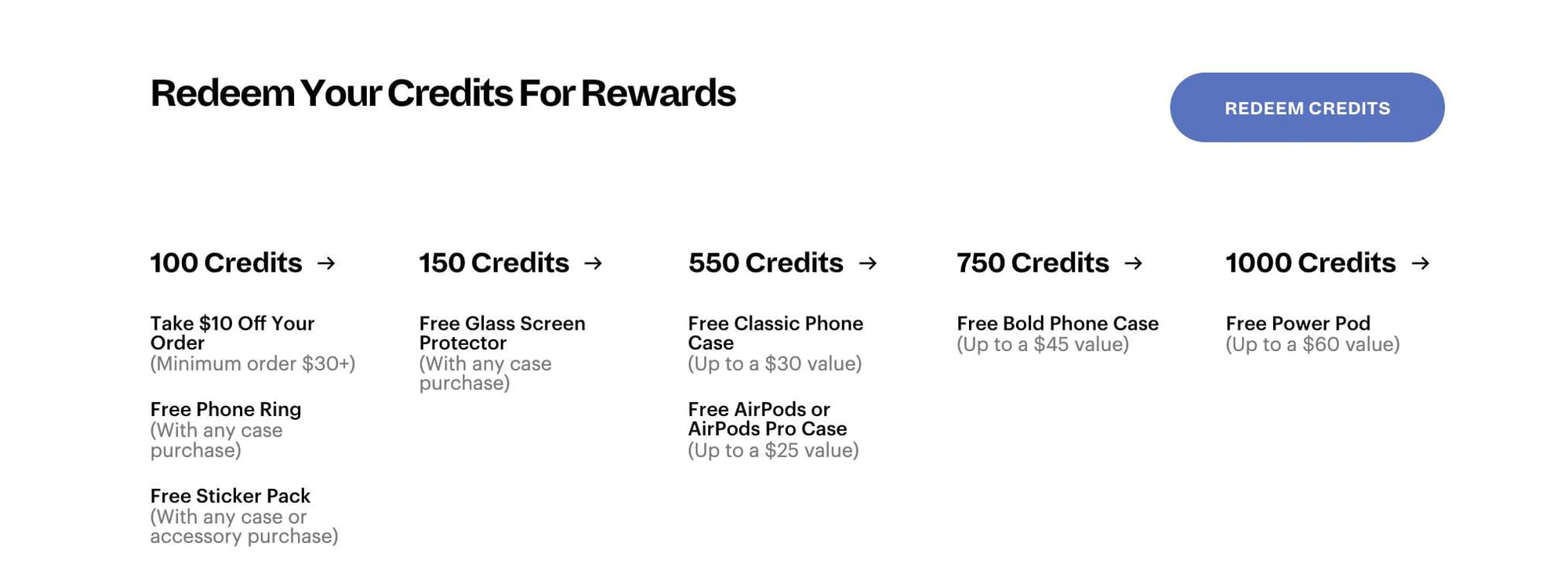
Prompt repeat purchases with easy to measure progress
A VIP program is only truly effective if customers are motivated to spend more or spend often to reach higher tiers. This is why increasing repeat sales is often cited as a program’s number one goal. The trick, of course, is getting customers to commit to making ongoing purchases with your store.

This is where the consistency principle of gamification comes in. Since your program members will want to maintain their VIP status, they will be more willing to make purchases at your store than first-time visitors. However, don’t take this desire for granted! Goals are always more motivating if you can see and track your progress. That’s why many health and fitness apps visually track results like weight loss, run speed, or miles walked.
In your VIP loyalty program, customers are much more likely to pursue and maintain higher tier status if they can see both where they currently stand and how much further they need to go.
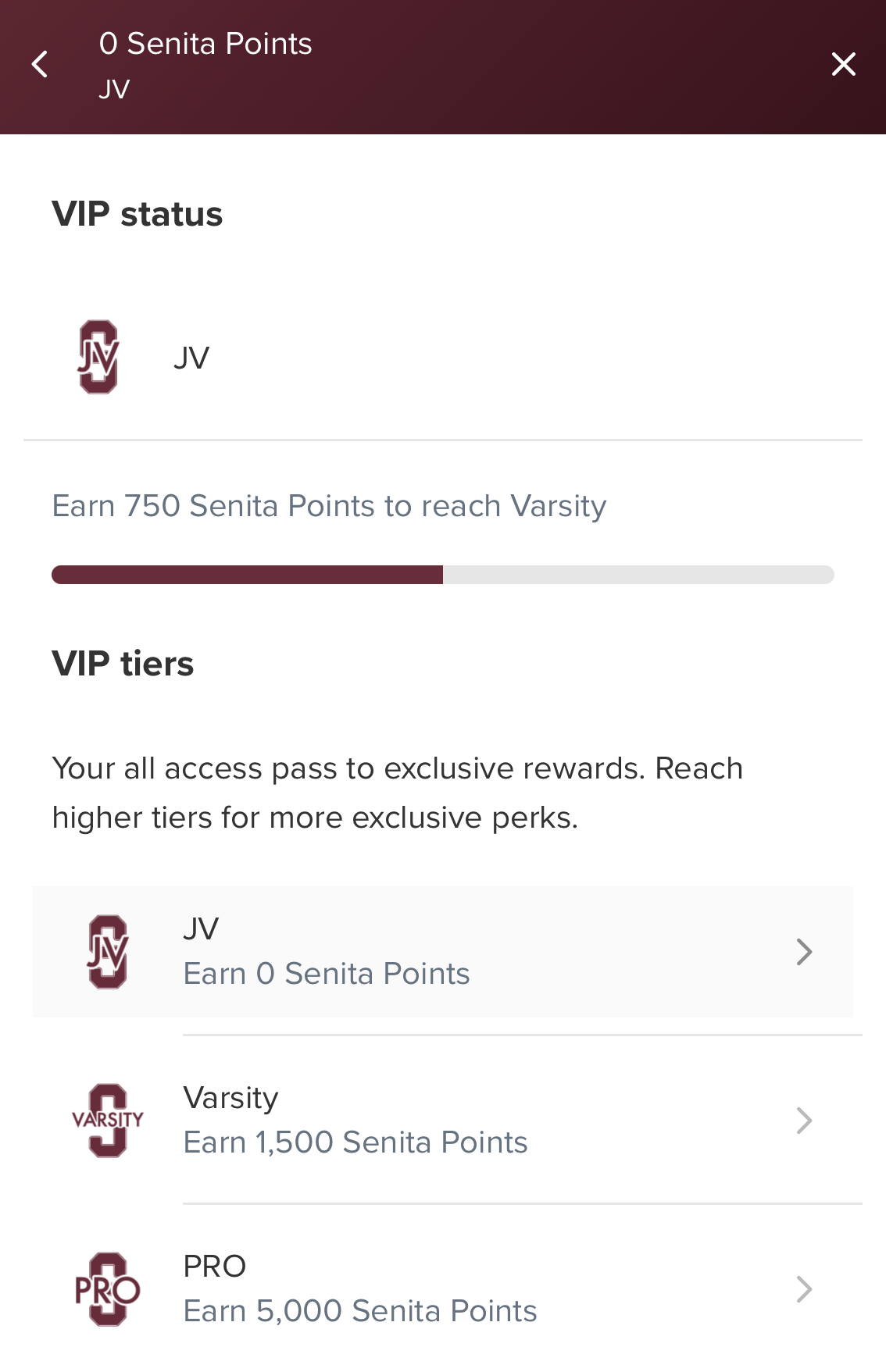
A visual progress bar is a highly effective way of communicating this information. Senita Athletics has done a beautiful job of customizing its rewards modal to reflect both their brand and how close each customer is to their next reward. These visual cues help root each shopper in the brand experience, keeping them focused on reaching their next goal.
Having a customer’s program status so close at hand helps invest them even deeper into your brand and how they see themselves in relation to it. By keeping their elite status readily available, customers will be reminded of the value they stand to lose (and gain) by completing valuable actions, increasing your engagement and repeat purchases at the same time.
Encourage brand advocacy with social cues
The last–but certainly not least–way that you can incorporate gamification into your VIP program is with social rewards.
We’ve already talked about how much people like to share their achievements online, and if your top tier feels exclusive they will most definitely want to brag about that achievement. So give them an outlet!
Reward your customers for following your brand on Instagram, sharing your store on Twitter, or leaving a product review. This will generate the ever valuable user-generated content (UGC) that we talked about earlier and how valuable it is towards your loyalty strategy.
These actions help contribute to the brand identity you’re building online and provide valuable social proof that can mean the difference between new customers checking out your store or passing it by. Especially as more consumers head to social media first to learn more about a brand.
Sweet Lounge is a UK-based vegan and plant based candy brand that rewards users for different actions. Including if customers like them on Facebook, follow on Instagram, and share reviews across social media platforms. This opportunity to earn points while being brand advocates cover every area of the social spectrum. It benefits the customer and the business.
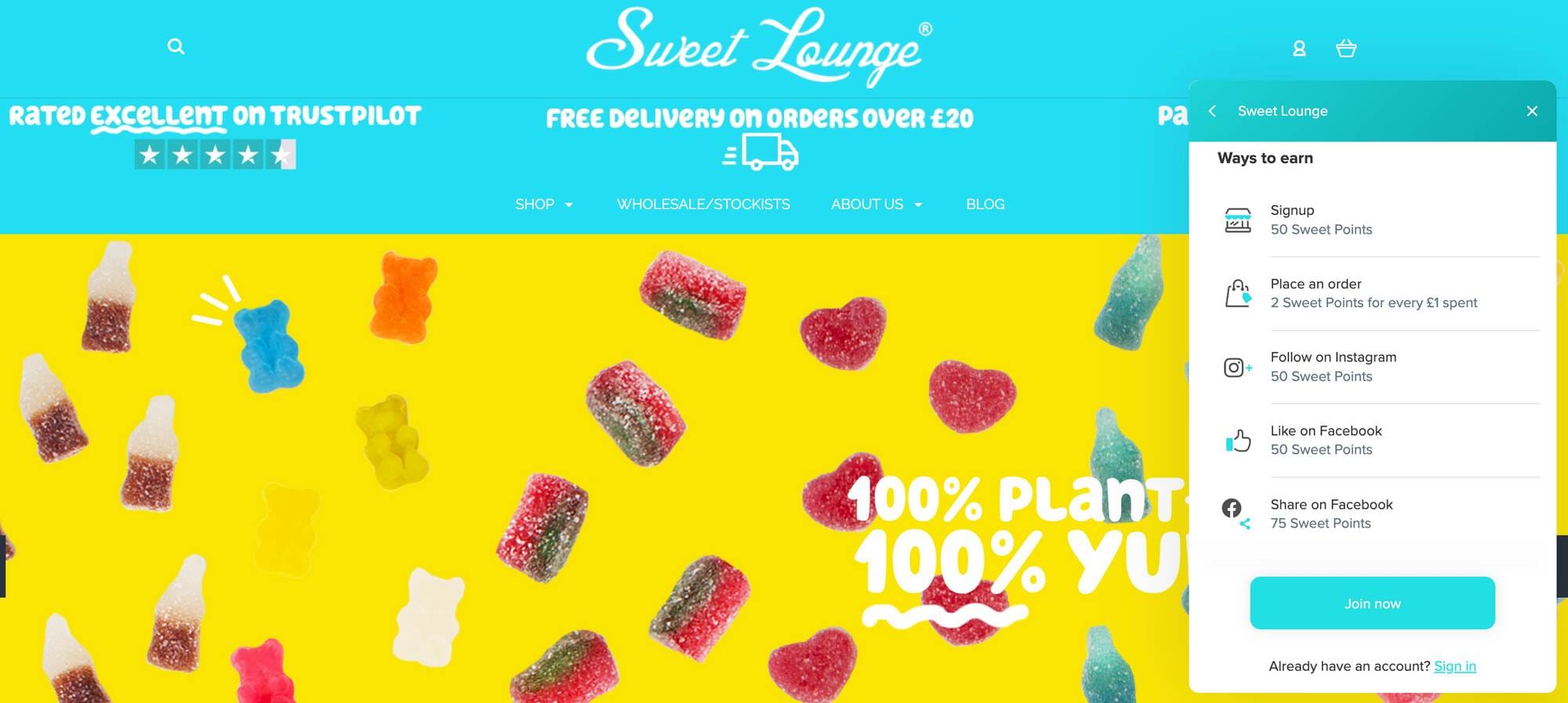
Making it easy for your members to contribute to the social conversation around your brand will move you closer to achieving your brand ambassador goals and ultimately build an authentic community. With an expanded marketing reach and organic UGC, your brand’s social proof will increase exponentially and your program will continue to grow–all without increasing your ad spend.
Gaming the VIP system with gamification
Gamification is an incredibly powerful tool if you understand the rules of the game. By leveraging your program’s goals and the psychological factors behind them, you can use gamification to improve your repeat purchase rate, increase your program enrollment rate, and develop impactful brand advocates that take your program to the next level.
With a professional explainer page, progress bar, and social rewards, your VIP program can go from barely surviving to outstandingly thriving–all it takes is a little gamification. Customer loyalty isn’t a game, but that doesn’t mean you can’t win.











